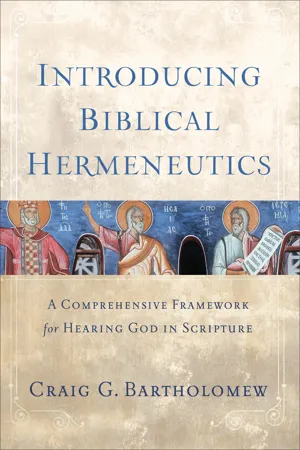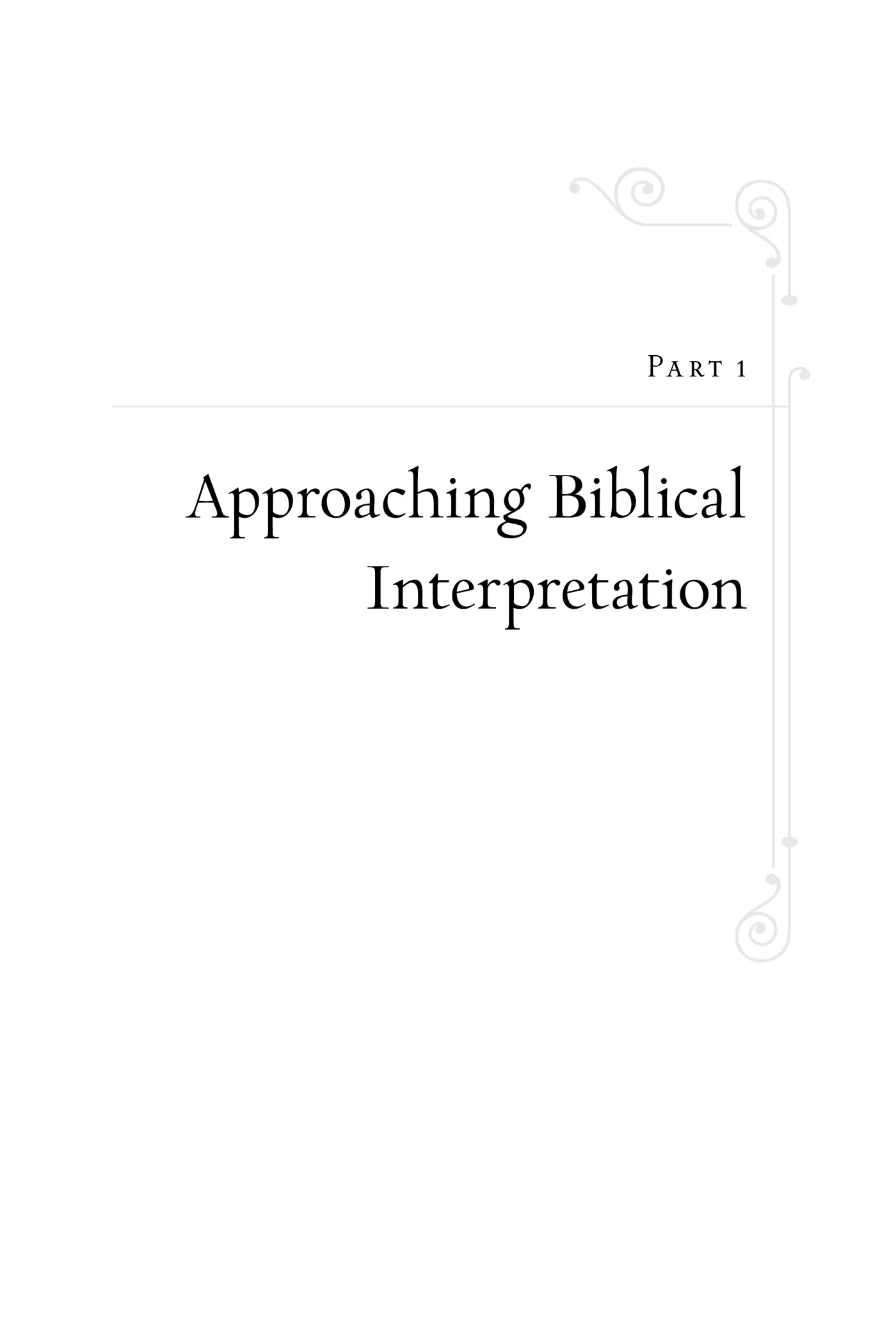
eBook - ePub
Introducing Biblical Hermeneutics
A Comprehensive Framework for Hearing God in Scripture
Bartholomew, Craig G.
This is a test
- 640 Seiten
- English
- ePUB (handyfreundlich)
- Über iOS und Android verfügbar
eBook - ePub
Introducing Biblical Hermeneutics
A Comprehensive Framework for Hearing God in Scripture
Bartholomew, Craig G.
Angaben zum Buch
Buchvorschau
Inhaltsverzeichnis
Quellenangaben
Über dieses Buch
2016 Word Guild Award - Academic category
Honorable mention, Grace Irwin Prize Renowned scholar Craig Bartholomew, coauthor of the bestselling textbook The Drama of Scripture, writes in his main area of expertise--hermeneutics--to help seminarians pursue a lifetime of biblical interpretation. Integrating the latest research in theology, philosophy, and biblical studies, this substantive hermeneutics textbook is robustly theological in its approach, takes philosophical hermeneutics seriously, keeps the focus throughout on the actual process of interpreting Scripture, and argues that biblical interpretation should be centered in the context and service of the church--an approach that helps us hear God's address today.
Häufig gestellte Fragen
Wie kann ich mein Abo kündigen?
Gehe einfach zum Kontobereich in den Einstellungen und klicke auf „Abo kündigen“ – ganz einfach. Nachdem du gekündigt hast, bleibt deine Mitgliedschaft für den verbleibenden Abozeitraum, den du bereits bezahlt hast, aktiv. Mehr Informationen hier.
(Wie) Kann ich Bücher herunterladen?
Derzeit stehen all unsere auf Mobilgeräte reagierenden ePub-Bücher zum Download über die App zur Verfügung. Die meisten unserer PDFs stehen ebenfalls zum Download bereit; wir arbeiten daran, auch die übrigen PDFs zum Download anzubieten, bei denen dies aktuell noch nicht möglich ist. Weitere Informationen hier.
Welcher Unterschied besteht bei den Preisen zwischen den Aboplänen?
Mit beiden Aboplänen erhältst du vollen Zugang zur Bibliothek und allen Funktionen von Perlego. Die einzigen Unterschiede bestehen im Preis und dem Abozeitraum: Mit dem Jahresabo sparst du auf 12 Monate gerechnet im Vergleich zum Monatsabo rund 30 %.
Was ist Perlego?
Wir sind ein Online-Abodienst für Lehrbücher, bei dem du für weniger als den Preis eines einzelnen Buches pro Monat Zugang zu einer ganzen Online-Bibliothek erhältst. Mit über 1 Million Büchern zu über 1.000 verschiedenen Themen haben wir bestimmt alles, was du brauchst! Weitere Informationen hier.
Unterstützt Perlego Text-zu-Sprache?
Achte auf das Symbol zum Vorlesen in deinem nächsten Buch, um zu sehen, ob du es dir auch anhören kannst. Bei diesem Tool wird dir Text laut vorgelesen, wobei der Text beim Vorlesen auch grafisch hervorgehoben wird. Du kannst das Vorlesen jederzeit anhalten, beschleunigen und verlangsamen. Weitere Informationen hier.
Ist Introducing Biblical Hermeneutics als Online-PDF/ePub verfügbar?
Ja, du hast Zugang zu Introducing Biblical Hermeneutics von Bartholomew, Craig G. im PDF- und/oder ePub-Format sowie zu anderen beliebten Büchern aus Théologie et religion & Études bibliques. Aus unserem Katalog stehen dir über 1 Million Bücher zur Verfügung.
Information
Thema
Études bibliquesPart 1: Approaching Biblical Interpretation

1
Biblical Interpretation Coram Deo
In this way I hope to be able to show most clearly to my readers that hermeneutics is no esoteric teaching but the theory of a practice.
Hans Robert Jauss1
Introduction
It is hard to overestimate what is at stake in biblical interpretation. According to Hebrews, “in these last days he [God] has spoken to us by a Son, whom he appointed heir of all things, through whom he also created the worlds” (Heb. 1:2). Similarly in 1 John we read:
We declare to you what was from the beginning, what we have heard, what we have seen with our eyes, what we have looked at and touched with our hands, concerning the word of life—this life was revealed, and we have seen it and testify to it, and declare to you the eternal life that was with the Father and was revealed to us—we declare to you what we have seen and heard so that you also may have fellowship with us; and truly our fellowship is with the Father and with his Son Jesus Christ. (1 John 1:1–3)
If for a moment we defamiliarize ourselves with these texts, step back, and quietly reflect on them, we begin to sense the enormity of their claims:
In these last days . . . God has spoken . . . by a Son . . . through whom he created the worlds . . . what was from the beginning . . . what we have seen . . . what we have touched . . . the word of life . . . we declare to you.
If these claims are true, then their implications are huge, and they connect with our deepest needs. In Ecclesiastes, Qohelet observes in chapter 3 that God has put eternity in our hearts, but we cannot find out what God has done from the beginning to the end.2 We are creatures who need to know the true, grand story of which we are part, and Qohelet fingers the frustration and despair that follow when this need is not met. Hebrews and 1 John tell us, however, that it has been met.
This is truly good news, and not least for the present. We live amid turbulent times, and some in the West would have us embrace and celebrate the nihilism that postmodernism has brought in its wake. Roy Brassier in his Nihil Unbound, for example, asserts that
the disenchantment of the world deserves to be celebrated as an achievement of intellectual maturity, not bewailed as a debilitating impoverishment. . . . Nature is not our or anyone’s “home,” nor a particularly beneficent progenitor. Philosophers would do well to desist from issuing any further injunctions about the need to re-establish the meaningfulness of existence, the purposefulness of life, or mend the shattered concord between man and nature. . . . Nihilism is not an existential quandary but a speculative opportunity.3
One needs to reflect on this statement in relation to the above passages. In my opinion such a shocking view is possible only amid the bloated comfort of the West, which has enjoyed some seventy years of relative peace and affluence. By comparison, the Brazilian theologian Leonardo Boff evokes the experience of far too many in our world: “There is a suffering humanity whose way of the cross has as many stations as that of the Lord when he suffered among us in Palestine.”4 Boff is equally clear that it is not just humanity but the entire creation that groans amid these stations of the cross. For the poor of our world, an increasing number of whom are found in the West, whose lives are already characterized by disenchantment, meaninglessness, and displacement, it would be absurd and evil to encourage them cheerfully to embrace nihilism as a “speculative opportunity.”
There is much darkness in our world, and Jesus, John tells us, is the light of the world. He dispels the darkness, brings healing, and helps our world find its way toward the goal of rest that God has in mind for it. It is in the Bible that we find the authoritative witness to Jesus. Indeed, the great joy of the Spirit is to use Scripture to open us up to the reality of the Lord Christ. If, as I like to think of it, Scripture is that field in which is hid the pearl of great price, then healthy biblical interpretation that keeps on excavating this pearl is vital not just for the life of the church but also for the life of the world. Thus, there is indeed much at stake in biblical interpretation.
What does healthy biblical interpretation look like?
A Trinitarian Hermeneutic
I assume—although this can no longer be taken for granted—that (Christian) biblical scholars aim to excavate “the truth” when they interpret the Bible. However, “truth” is not as simple as it may seem. It has become common to hear the view expressed that one must pursue the truth wherever it takes one. While a real openness to the evidence is indispensable, the problem with this approach is that the view of truth involved is rarely explicit and tends to presuppose a view of truth as autonomous, value-free research. Postmodernism has rightly helped us to see that such a view is a myth: all of us approach the world in particular ways and with particular foundational commitments. In my view, true progress would be made if scholars brought their foundational commitments out into the open and if the academy, including such organizations as the American Academy of Religion and the Society of Biblical Literature, fostered a genuine pluralism in which different foundational commitments were allowed to come to expression so that the real, in-depth dialogue could begin.
So, what are my foundational commitments? I take it for granted that, for Christians, our understanding of the world must take as its starting point the God revealed in Scripture and articulated in the tradition. This means that any biblical hermeneutic worth its salt must be christocentric. One cannot take seriously the quotes from Hebrews and 1 John above and avoid this. As Karl Barth says of Jesus: “This man is the secret of heaven and earth, of the cosmos created by God.”5 Similarly Lesslie Newbigin asserts that Christ is the clue to the whole of creation.6 And as Thomas Aquinas put it, “He was also full of truth, because the human nature in Christ attained to the divine truth itself, that is, that this man should be the divine Truth itself. In other men we find many participated truths, insofar as the First Truth gleams back into their minds through many likenesses; but Christ is Truth itself.”7 However, precisely because such a hermeneutic is christocentric, it will be trinitarian. In Jesus’s Jewish context of monotheism, the New Testament awareness of him as “truly God” made the postcanonical development of the doctrine of the Trinity inevitable.
There are many biblical entrances into the concept of truth, but here I will follow several theologians in entering through John’s Gospel.8 The question of truth comes famously to the fore in Pilate’s interrogation of Jesus in John 18:28–19:16a. At stake is whether Jesus is “king of the Jews.” Jesus replies that he “came into the world to testify to the truth” and that “everyone who belongs to the truth listens to his voice” (18:37 altered). As Herman Ridderbos notes:
Jesus’ kingship consists in the utterly unique authority with which he represents the truth in the world. His birth and coming has no other purpose than to “bear witness” to the truth, in the absolute sense in which the Fourth Gospel continually speaks of the truth: Jesus testifies to what “he has seen and heard of the Father” (cf. 3:31–36), indeed to the truth that he himself is (14:6) and for which he answ...
Inhaltsverzeichnis
- Cover
- Title Page
- Copyright Page
- Endorsements
- Dedication
- Contents
- Preface
- Abbreviations
- Part 1: Approaching Biblical Interpretation
- Part 2: Biblical Interpretation and Biblical Theology
- Part 3: The Story of Biblical Interpretation
- Part 4: Biblical Interpretation and the Academic Disciplines
- Part 5: The Goal of Biblical Interpretation
- Bibliography
- Subject Index
- Scripture Index
- Author Index
- Back Cover
Zitierstile für Introducing Biblical Hermeneutics
APA 6 Citation
[author missing]. (2015). Introducing Biblical Hermeneutics ([edition unavailable]). Baker Publishing Group. Retrieved from https://www.perlego.com/book/2039623/introducing-biblical-hermeneutics-a-comprehensive-framework-for-hearing-god-in-scripture-pdf (Original work published 2015)
Chicago Citation
[author missing]. (2015) 2015. Introducing Biblical Hermeneutics. [Edition unavailable]. Baker Publishing Group. https://www.perlego.com/book/2039623/introducing-biblical-hermeneutics-a-comprehensive-framework-for-hearing-god-in-scripture-pdf.
Harvard Citation
[author missing] (2015) Introducing Biblical Hermeneutics. [edition unavailable]. Baker Publishing Group. Available at: https://www.perlego.com/book/2039623/introducing-biblical-hermeneutics-a-comprehensive-framework-for-hearing-god-in-scripture-pdf (Accessed: 15 October 2022).
MLA 7 Citation
[author missing]. Introducing Biblical Hermeneutics. [edition unavailable]. Baker Publishing Group, 2015. Web. 15 Oct. 2022.